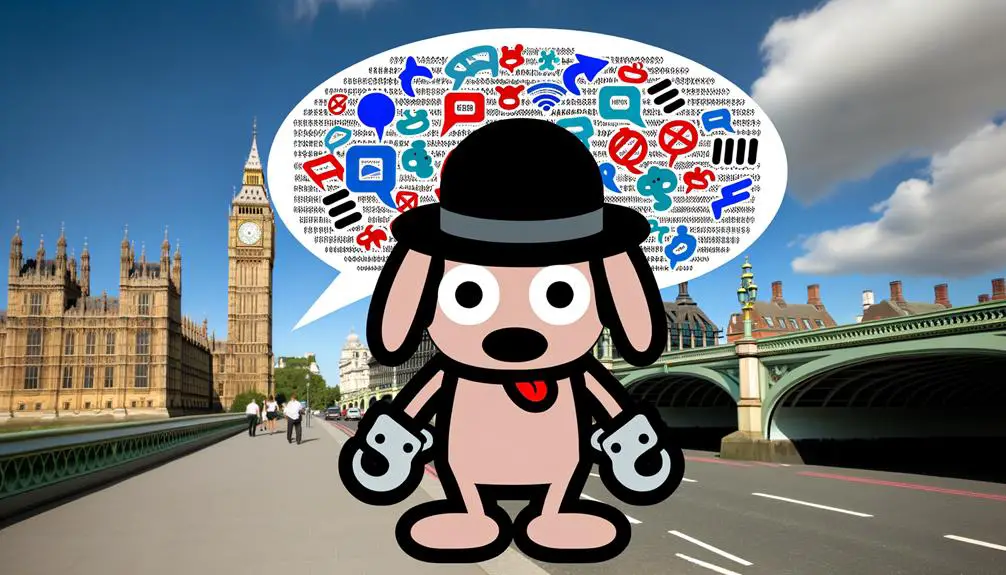In British slang, when you hear someone's "barking," it doesn't mean they're impersonating a dog. Instead, you're hearing a colorful, slightly cheeky way to say they're acting irrationally or showing madness. This term is steeped in rich linguistic history, evolving through social and cultural shifts to capture the essence of someone losing touch with reality, with a unique British twist. Unlike American slang, which might use words like "nuts," "barking" brings an animalistic, auditory imagery. It's a vivid descriptor that, used with the right timing and understanding of British humor, adds depth to observations. Unpacking its usage and variations offers an intriguing insight into British culture.
Key Takeaways
- In British slang, 'barking' refers to showing irrational or mad behavior.
- It originates from the longer phrase 'barking mad,' suggesting a loss of touch with reality.
- The term employs animalistic imagery, particularly the act of a dog barking, to depict madness.
- Usage of 'barking' requires an understanding of British humor and social norms.
- 'Barking' showcases linguistic evolution, reflecting changes in society and language over time.
The Origins of 'Barking'
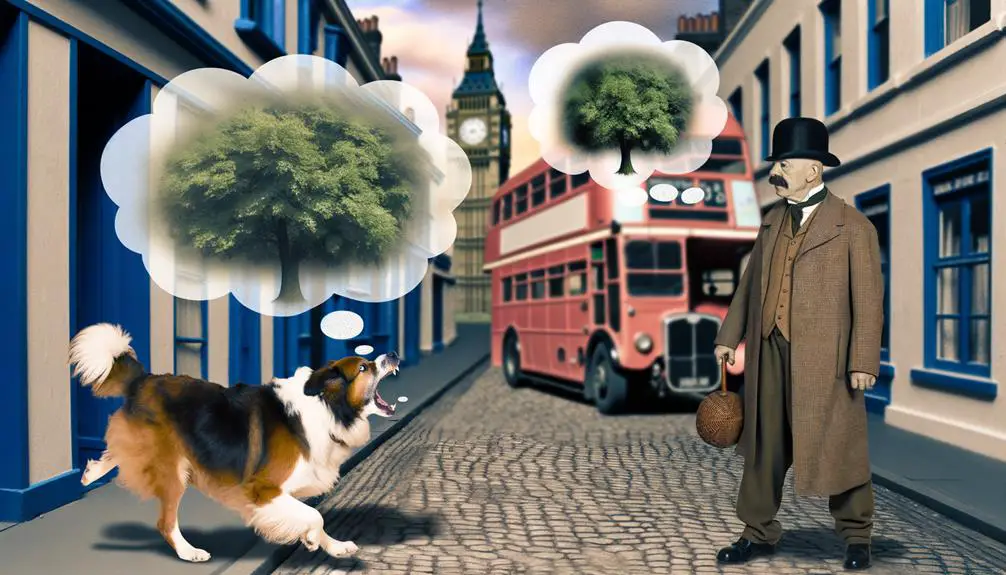
In exploring the origins of 'barking,' it's important to understand that this piece of British slang has evolved greatly over time, reflecting broader changes in linguistic and cultural landscapes. The term's journey from its initial conception to its current usage is a prime example of linguistic evolution, showcasing how language adapts and transforms to fit the changing dynamics of its speakers' environment.
You'll find that 'barking's' metamorphosis is not just a tale of words but also one rich in cultural implications. It serves as a mirror, reflecting the nuances of British society through the ages. This evolution has been influenced by various factors, including social changes, migrations, and even technological advancements, each leaving its mark on the language.
Understanding 'barking' within this context allows you to appreciate the complexity and depth of British slang. It's more than just a quirky addition to the English language; it's a reflection of the fluid nature of communication, highlighting how expressions can gain, lose, or change meanings over time. This linguistic adaptability guarantees that slang like 'barking' remains relevant, capturing the essence of the era it represents while contributing to the rich tapestry of the English language.
'Barking' Decoded
You've explored the roots of 'barking' and how it emerged within British lexicon. Now, it's important to understand how 'barking' evolved from its original connotations to its place in modern discourse. This shift reveals much about linguistic adaptation and the fluid nature of slang within English language dynamics.
Origins of 'Barking'
Delving into the origins of 'barking,' it's clear this British slang term has a rich and multifaceted history that goes beyond its literal meaning. The word's association with madness etymology is not accidental. Historically, 'barking mad' emerged as a colloquial expression, deeply rooted in the psychiatric usage of the early 20th century. This phrase, suggesting a departure from sanity as vividly as a dog's uncontrolled barking, underscores the intense imagery Britons often employ to describe mental instability. The term's evolution within psychiatric contexts underscores a societal attempt to grapple with mental health issues through language. This etymological journey from a clinical descriptor to everyday slang encapsulates the broader shifts in understanding and discussing mental health within British culture.
'Barking' in Modern Usage
Today's landscape of British slang reveals that 'barking' has transcended its historical roots, adopting nuances that reflect contemporary attitudes towards eccentricity and mental health. You'll find that barking etiquette and cultural perceptions have evolved, illustrating a shift in how expressions of mental health are understood and discussed.
| Aspect | Description |
|---|---|
| Cultural Shift | More empathetic, less stigmatizing |
| Usage | Varied, not always pejorative |
| Context | Can signify jest or concern, depending on tone |
| Etiquette | Awareness of mental health impacts phrasing |
| Perceptions | Reflects broader acceptance of mental health issues |
This table encapsulates the complexity of 'barking' in modern British slang, underlining the importance of context, tone, and evolving social norms in its interpretation.
Common Uses in Speech
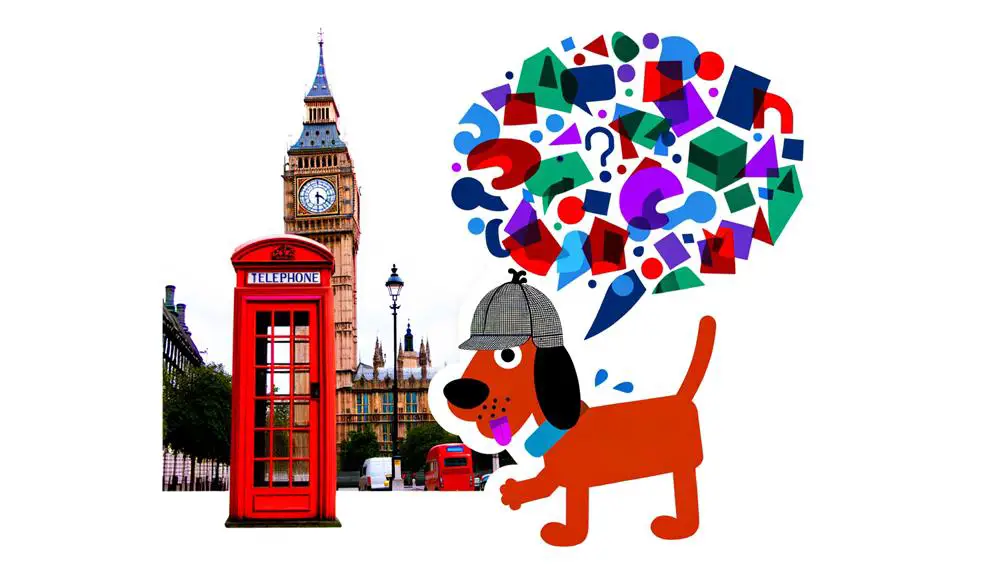
In British slang, 'barking' is commonly used to describe someone's irrational or mad behavior, showcasing a broad application in everyday conversation. When you delve into the nuances of this term, you'll find that 'barking etiquette' and 'expressive barks' play significant roles in its usage. Understanding when and how to use 'barking' requires a grasp of the subtleties of British humor and social norms. It's not just about labeling someone as mad; it's about doing so with a particular blend of wit and timing.
Expressive barks, for instance, are not just random outbursts. They're carefully chosen moments when this term can add color and depth to an observation or an argument. You're not just saying someone is being irrational; you're painting their actions with a broader cultural brushstroke that invokes a rich tradition of British understatement and dry wit.
Barking etiquette, meanwhile, dictates the appropriateness of using such a term. It's considered poor form to accuse someone of barking without a certain level of familiarity or in a context where humor and levity are welcome. The key is understanding the audience and the situation, ensuring that what's intended as a playful jab doesn't come off as a harsh critique.
'Barking' Vs. American Slang
While exploring the nuances of 'barking' in British slang, it's interesting to compare how this term stacks up against American slang expressions for irrational or mad behavior. 'Barking', in the UK, conveys images of someone who has lost touch with reality, akin to a dog's uncontrollable, often senseless, vocalizations. This metaphor draws directly from dog communication, where barking can range in meaning but is primarily seen as a reactionary or alerting behavior. The vocal pitch of a bark, much like the tone used when someone is described as 'barking' in a British context, suggests an unhinged or frantic state.
In contrast, American slang might lean towards terms like 'nuts', 'off the deep end', or 'losing it' to describe similar states of mind. These phrases, while vivid, don't directly invoke the same animalistic imagery or the specific auditory element – the chaotic, unpredictable pitch of barking – that the British 'barking' does. This difference highlights the cultural nuances in how English-speaking populations utilize the rich tapestry of language to depict mental instability, with the British version embedding a layer of dog communication to emphasize the loss of rational control.
Variations of 'Barking'

Exploring 'barking' further reveals its diverse applications, where subtle variations in context or tone can greatly alter its meaning. In the nuanced world of British slang, 'barking' isn't just a blanket term; it's a linguistic chameleon, adapting to its surroundings with remarkable agility. Understanding the variations of 'barking' requires a grasp of barking etiquette, which governs its use depending on the social setting and the relationship between the speaker and listener. This protocol guarantees that the term conveys the intended message, whether it's jest, derision, or genuine concern for someone's mental state.
Barking alternatives also enrich the lexicon, offering a range of expressions that capture the essence of 'barking' without directly invoking it. Phrases like 'off one's trolley' or 'round the bend' serve similar purposes, enabling speakers to navigate the delicate balance between colorful expression and social propriety. Each alternative carries its own connotation, subtly shifting the emphasis from the speaker's perception of the situation to a more inclusive, sometimes humorous, acknowledgment of the absurdity at hand.
In essence, the variations of 'barking' and its alternatives highlight the rich tapestry of British slang, where precision, context, and tone play pivotal roles in communication.
In Pop Culture and Media
British slang, particularly the term 'barking,' has woven its way into pop culture and media, reflecting and shaping societal attitudes towards mental health and eccentricity. You've likely noticed the playful yet pointed references to 'barking mad' in various British comedies and dramas, a nod to characters whose actions teeter on the edge of societal norms. This phrase, rich in connotation, serves not just as a descriptor but as a cultural barometer, measuring the shifting perceptions of eccentricity and mental wellbeing.
Barking celebrities, those in the public eye who embrace their quirks, further illustrate this slang's impact. They often become beloved figures, their eccentricities celebrated as marks of genuineness in a sea of polished personas. It's not just individuals, though; 'barking memes' circulate widely on social media, using humor to comment on the absurdity of daily life or the state of the world. These memes, while lighthearted, underscore the term's dual nature—acknowledging the fine line between eccentricity and something more concerning.
In dissecting the role of 'barking' in pop culture and media, it's clear the term does more than label; it questions, critiques, and ultimately connects us, offering a shared language for our most human experiences.
Regional Differences
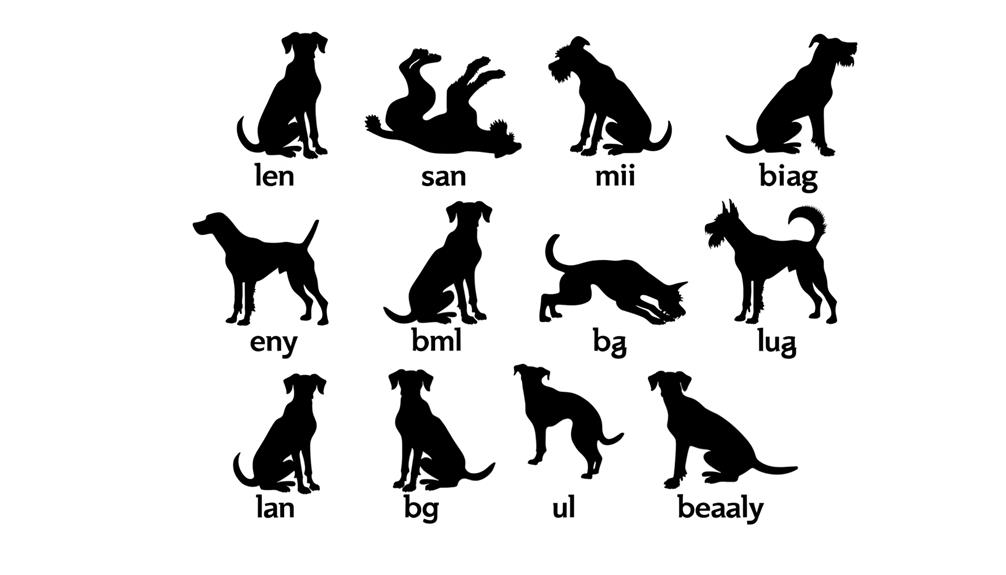
You'll find that the meaning of 'barking' varies markedly across the UK, influenced by geographic locations. Local interpretations and usage add layers of complexity, with dialects shaping the slang in unique ways. Understanding these regional differences is key to grasping the full spectrum of 'barking's' application and significance.
Geographic Variations in Meaning
Delving into the term 'barking' reveals a rich tapestry of interpretations across the UK, each region adding its unique inflection to the slang. Your understanding of 'barking' can deepen with dialect research, especially when making international comparisons. This exploration underscores the significance of geographical nuances in slang interpretation.
- North England: Often signifies a strong disbelief or amazement, diverging from mere eccentricity.
- South England: More closely aligned with notions of madness or silliness.
- Scotland: Can denote a sense of being outwitted or fooled.
- Wales: Emphasizes a more playful, jesting form of craziness.
This regional diversity illustrates the complex web of meanings 'barking' can weave, influenced by local culture and dialectical variations.
Local Interpretations and Usage
Exploring regional differences further highlights how 'barking' is woven into the fabric of local dialects across the UK, offering a nuanced lens through which to understand its usage. In London, you might hear 'barking' used more liberally, reflecting its deeper integration into the vernacular. Contrastingly, in Northern regions, its application could be more sparing or imbued with slightly different connotations, underscoring the richness of dialect comparisons. This slang's evolution is particularly fascinating when you observe how its interpretation and acceptance vary, not just between generations, but also across geographical divides. Such local interpretations enrich the understanding of 'barking,' demonstrating its flexibility and the dynamic nature of language as it adapts to the contours of regional identities.
Dialect Influence on Slang
The influence of regional dialects on slang, particularly the term 'barking,' reveals a tapestry of linguistic diversity across the UK. Language evolution and cultural influences have shaped how this term, among others, explores and adapts, reflecting the unique character of each region. As you investigate further, consider:
- The role of historical migration patterns in diversifying local dialects and slang
- How cultural influences, such as local industries or historical events, imprint on language
- The impact of media and technology on standardizing language, yet allowing regional slang to flourish
- The ongoing dialogue between urban and rural dialects in shaping the meaning of slang terms
This linguistic mosaic not only enriches the English language but also offers a window into the UK's rich cultural fabric.
How to Use 'Barking' Correctly
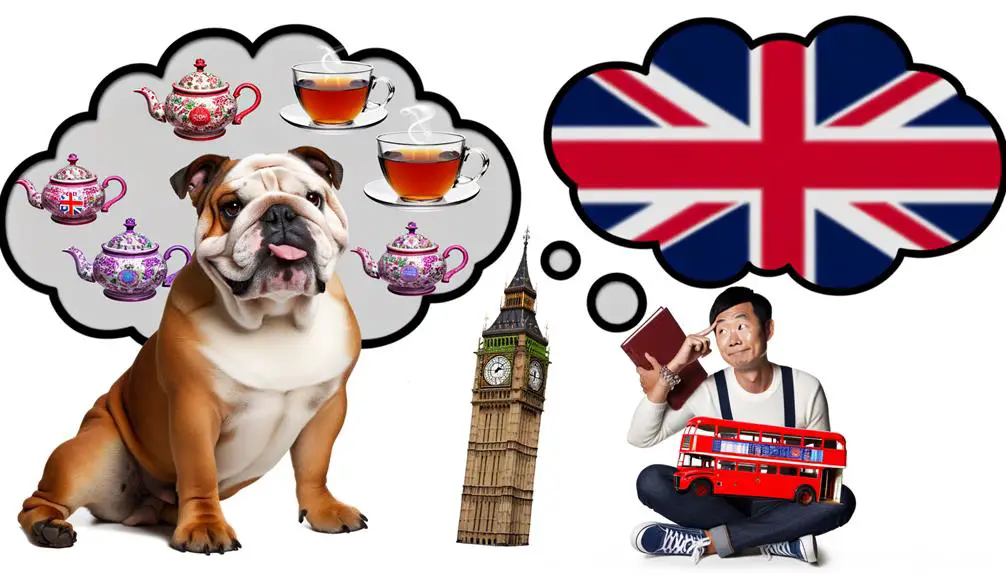
Understanding the proper context for using 'barking' is essential if you're aiming to integrate this piece of British slang into your vocabulary accurately. In the rich tapestry of British English, 'barking' often transcends its literal canine connotations, venturing into the domain of human behavior and speaking styles. This expression, rooted in dog metaphors, serves as a vivid descriptor for someone's mental state or the manner in which they communicate.
When you're considering using 'barking' in conversation, it's important to grasp its dual nature. To begin with, it can denote that someone is mad or not making sense, akin to saying someone is 'barking mad.' This usage is steeped in the imagery of a dog barking incessantly, without clear reason or provocation. It's a vivid metaphor for illogical or irrational behavior.
Secondly, 'barking' can critique speaking styles that are perceived as overly loud or aggressive, mirroring a dog's bark in volume and tone. This application underscores the importance of tone and context in speech. When you wield 'barking' to describe someone's communication approach, you're drawing on deep-seated cultural associations with dogs' vocal expressions to critique human interaction.
Hence, mastering the use of 'barking' requires an understanding of these nuances, ensuring you convey your intended meaning with precision and cultural awareness.
Misinterpretations and Clarifications
You might find yourself puzzled by the real essence of 'barking' within British slang, often misconstrued by non-natives. It's imperative to dissect common misunderstandings, offering a clear delineation of its authentic significance to sidestep interpretation blunders. By honing in on these clarifications, you guarantee your usage mirrors the intended meaning, enriching your conversational fluency.
Common Misunderstandings Explained
Delving into British slang, it's important to clarify that 'barking' often leads to humorous misunderstandings, especially among those unfamiliar with its nuanced usage. Misinterpretations are largely due to language evolution and varying cultural context, which can blur the original meaning and usage of the term. To navigate these waters, consider the following points:
- *Barking* isn't always literal; context is key.
- Misunderstandings stem from ignoring the cultural context.
- Slang evolves, and so does the interpretation of barking
- Recognizing regional variations is essential for comprehension.
Understanding these aspects helps in appreciating the richness of British slang and prevents the common pitfall of taking words at face value without considering their cultural and contextual backdrop.
Clarifying Barkings Real Meaning
To grasp the real essence of 'barking' in British slang, it's imperative to explore its common misinterpretations and offer precise clarifications. Often misconstrued as merely mimicking dog communication, the term goes deeper, signifying a state of mind that's out of the ordinary. It's not just about making noise or being loud; it's a nuanced way of indicating that someone's thoughts or behaviors are perceived as irrational or not aligned with societal norms. This understanding is vital as it ties directly into discussions around mental health, subtly acknowledging the fine line between eccentricity and needing support. Recognizing this slang within its cultural context enriches your comprehension, allowing you to see beyond the surface level comparisons to canine behavior.
Avoiding Interpretation Errors
Understanding 'barking' within British slang requires careful navigation to avoid common misinterpretations. To grasp its full meaning without falling into traps of misunderstanding, you've got to take into account:
- Cultural nuances that influence the interpretation of slang.
- The context in which 'barking' is used, as it can significantly alter its meaning.
- Language evolution, acknowledging how the meaning of 'barking' might have shifted over time.
- The speaker's intention, which is essential for understanding the sentiment behind the word.
Expanding Your British Slang Vocabulary
Broadening your British slang vocabulary requires recognizing the nuanced meanings behind seemingly ordinary words or phrases. Delving into the world of British idioms and slang synonyms, you'll uncover layers of linguistic tradition that offer a richer understanding of British culture. It's not just about learning what individual words mean but also how they interconnect to form a vibrant tapestry of expression.
Familiarizing yourself with slang synonyms, for example, can sharpen your ability to grasp context and tone in conversations. You'll learn that 'knackered' and 'cream crackered' both mean exhausted, providing you with insight into the playful nature of slang evolution and its role in daily communication. Similarly, understanding British idioms like 'Bob's your uncle' (meaning 'there you have it') adds a layer of cultural comprehension, illustrating the informal, often humorous way Britons might convey a sense of completion or success.
To truly broaden your vocabulary, it's essential to not only memorize these terms but to immerse yourself in their usage. Engage with British media, converse with native speakers, and practice incorporating these expressions into your own speech. This approach guarantees you're not just learning words but embracing the cultural context that gives them life.

